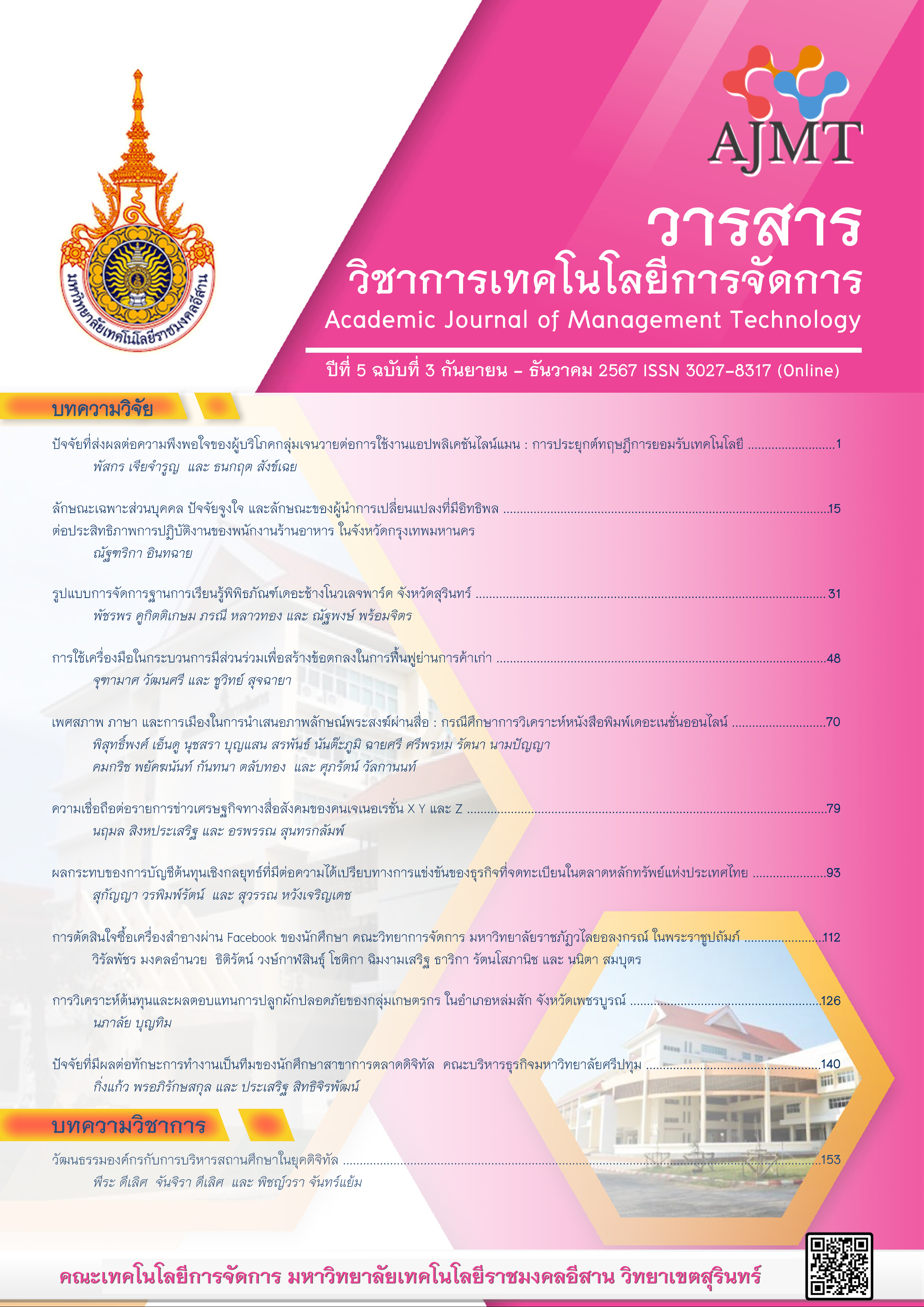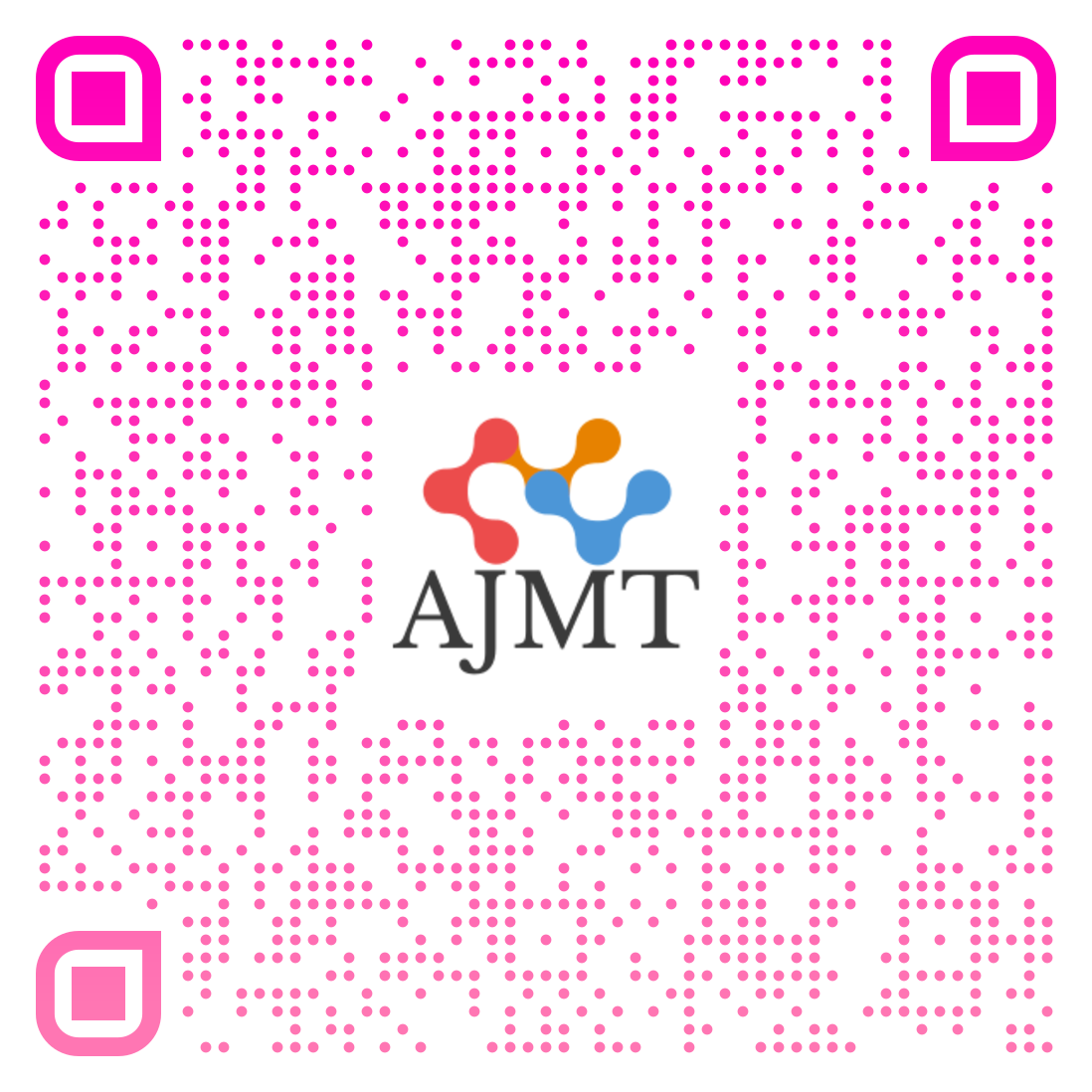ปัจจัยที่มีผลต่อทักษะการทำงานเป็นทีมของนักศึกษาสาขาการตลาดดิจิทัล คณะบริหารธุรกิจ มหาวิทยาลัยศรีปทุม
DOI:
https://doi.org/10.14456/ajmt.2024.31คำสำคัญ:
กระบวนการจัดการเรียนการสอนเชิงรุกแบบมีส่วนร่วม , การตลาดดิจิทัล , ทักษะการทำงานเป็นทีมบทคัดย่อ
การวิจัยครั้งนี้มีวัตถุประสงค์ เพื่อศึกษาระดับทักษะการทำงานเป็นทีม และกระบวนการเรียนรู้เชิงรุกแบบมีส่วนร่วมของนักศึกษาสาขาการตลาดดิจิทัล คณะบริหารธุรกิจ มหาวิทยาลัยศรีปทุม ผู้วิจัยกำหนดกลุ่มตัวอย่าง ในการศึกษาวิจัยครั้งนี้ นักศึกษาคณะบริหารธุรกิจทุกคนที่ลงทะเบียนในรายวิชา MKT453 การจัดการช่องทางการตลาดมหาวิทยาลัยศรีปทุมภาคการศึกษาที่ 2 ประจำปีการศึกษา 2565 ทั้งหมด จำนวน 93 คนเท่านั้น ผู้วิจัยได้ทำการวิเคราะห์ข้อมูล โดยการรวบรวมแบบสอบถามที่ได้รับทั้งหมด นำมาวิเคราะห์และประมวลผลข้อมูล โดยใช้โปรแกรมสำเร็จรูปทางสถิติเพื่อการวิจัย โดยกำหนดระดับความมีนัยสำคัญที่ 0.05 สถิติที่ใช้ในการวิเคราะห์ข้อมูลในการศึกษาครั้งนี้ มีดังนี้ ค่าความถี่ และค่าร้อยละ ค่าเฉลี่ย และค่าเบี่ยงเบนมาตรฐาน ผู้วิจัยใช้สถิติการทดสอบค่าที (t-test) แบบ Dependent การทดสอบค่าที (t-test) แบบ Independent การวิเคราะห์การถดถอยพหุคูณ ผลการวิจัย ภาพรวมพบว่า กระบวนการจัดการเรียนการสอนเชิงรุกแบบมีส่วนร่วมของนักศึกษา รายวิชา MKT453 การจัดการช่องทางการตลาด อยู่ในระดับมาก ส่วนด้านภาพรวมทักษะการทำงานเป็นทีมของนักศึกษา อยู่ในระดับมาก เช่นกัน ผลจากการวิจัยครั้งทำให้ข้อมูลที่น่าเชื่อถือในการนำไปใช้เป็นแนวทางในการปรับปรุงและพัฒนาออกแบบกิจกรรมการสอนและได้พัฒนาทักษะการทำงานเป็นทีมของนักศึกษารายวิชา MKT453 การจัดการช่องทางการตลาดด้วยกระบวนการเรียนรู้เชิงรุกแบบมีส่วนร่วม และผลการวิจัยสามารถใช้เป็นแนวทางในการดูแลรักษานักศึกษาให้ประสบความสำเร็จ ในการเรียนการสอนให้สามารถทำงานเป็นทีมได้ อีกทั้งผลการวิจัยจะช่วยให้ผู้บริหารและอาจารย์ใช้ในการกำหนดนโยบายและวางแผนในการออกแบบกิจกรรมการสอนได้อย่างเหมาะสม
เอกสารอ้างอิง
Anunpitoon, J. (2020). Developing teamwork skills in the food work course Using cooperativelearningfor students in Mathayom 2 [Unpublished Master’ s thesis]. Rangsit University.
Bonwell, C. C. & Eison, J. A. (1991). Active learning : Creating excitement in the classroom. ASHE-ERIC Higher Education Report, Washington DC : School of Education and Human Development, George Washington University.
Chaleamsri, A. (2020). Development of the ability to manage active learning of primary school teachers. with the professional learning community process [Doctoral dissertation, Srinakharinwirot University]. DSpace. http://irithesis.swu.ac.th/dspace/handle/123456789/1095
Gold, J. & Pedler, M. (2021). Bridging research to practice via action learning. Action Learning : Research and Practice, 19(1), 1 - 16.
Office of the Basic Education Commission, Ministry of Education. (2019). Active leaning. https://www.obec.go.th/archives/290290
Malawan, N., Chucgom, A., & Pangposok, N. (2022). Student teamwork : Causal factors Research suggestions. Journal of Roi Kaensarn Academi, 7(3), 425 - 438.
Pijitwarodom, K. (2018). Teamwork behavior of students in Grade 9, Anasamchan School High School, Thonburi [Bachelor’research,University]. ResearchGate. https://www.researchgate.net/profilePsychologyAndGuidanceSilpakorn2/publication/341988357_phvtikrrmkarthanganpenthimkhxngakreiynchanmathymsuksatxnplay_rongreiynxassamchaythnburi/links/5edcca2292851c9c5e8b0f4ephvtikrrmkarthanganpenthimkhxngnreiynchanmathymsuksatxnplayrongreiynxassamchaythnburi.pdf (inThai)
Srabua, A. (2017). Active learning plan. http://graduate.mcru.ac.th/V2/Document/PDF/2.5-2-8.pdf
Suchánek, P. (2019). Academic achievement prediction : Role of interest in learning and attitudeards school. International Journal of Humanities Social Sciences and Education, 1(11), 73 - 100.
Sukwiboon, T. (2009). Considerations in creating a rating scale tool for research. http://www.ms .src.ku.ac.th
ดาวน์โหลด
เผยแพร่แล้ว
รูปแบบการอ้างอิง
ฉบับ
ประเภทบทความ
สัญญาอนุญาต
ลิขสิทธิ์ (c) 2024 คณะเทคโนโลยีการจัดการ มหาวิทยาลัยเทคโนโลยีราชมงคลอีสาน วิทยาเขตสุรินทร์

อนุญาตภายใต้เงื่อนไข Creative Commons Attribution-NonCommercial-NoDerivatives 4.0 International License.
บทความที่ได้รับการตีพิมพ์เป็นลิขสิทธิ์ของคณะเทคโนโลยีการจัดการ มหาวิทยาลัยเทคโนโลยีราชมงคลอีสาน วิทยาเขตสุรินทร์
ข้อความที่ปรากฏในบทความแต่ละเรื่องในวารสารวิชาการเล่มนี้ เป็นความคิดเห็นส่วนตัวของผู้เขียนแต่ละท่านไม่เกี่ยวข้องกับคณะเทคโนโลยีการจัดการ มหาวิทยาลัยเทคโนโลยีราชมงคลอีสาน วิทยาเขตสุรินทร์ และคณาจารย์ท่านอื่นๆในมหาวิทยาลัยฯ แต่อย่างใด ความรับผิดชอบองค์ประกอบทั้งหมดของบทความแต่ละเรื่องเป็นของผู้เขียนแต่ละท่าน หากมีความผิดพลาดใดๆ ผู้เขียนแต่ละท่านจะรับผิดชอบบทความของตนเองแต่ผู้เดียว










